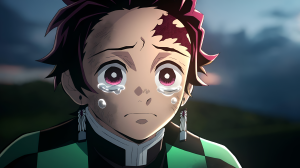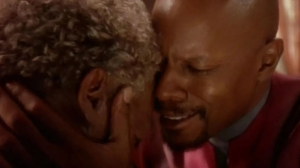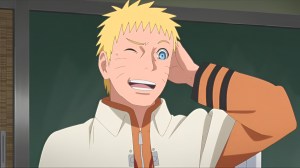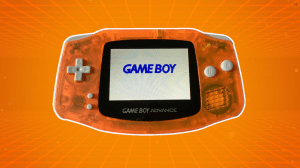Actor Sam Witwer gave life to one of the most enigmatic Star Wars villains for the last five years, voicing the former Darth Maul in Star Wars: The Clone Wars and the followup Star Wars Rebels.
Videos by ComicBook.com
Driven by revenge against his former Sith master who discarded him and the Jedi who cut him in half, Maul became twisted and deranged in his hunts, but he met a fateful end at the hands of Obi-Wan Kenobi in Star Wars Rebels Season Three.
With the collection of episodes hitting Blu-ray this week, we spoke with Witwer about his time in the Star Wars universe, how he embraces the role of Maul, his time as Starkiller for Star Wars: The Force Unleashed, and what plans the future has in store for him.

Starkiller Unleashed
You mentioned that Star Wars Rebels producer Dave Filoni had plans to include Starkiller as an Inquisitor in the show. Did you get in trouble for that?
Sam Witwer: (laughs) Did I get into trouble? (laughs) No, no, I didn’t, I didn’t. I don’t think there’s any trouble to be had, I mean, simply, Dave mentioned to me the scene he thought about and that it didn’t quite fit their story. It’s more of an interesting curio than anything. I mean, I always thought of the Starkiller thing as, even when we were doing it, I though of it sort of as a tall tale, because there certainly isn’t anything in the Star Wars movies that suggest that you could yank Star Destroyer out of the sky, and stuff like that.
Having said that, I always looked at it as, for video game, to pump everything up to 11, that all seems very appropriate for a video game. You know, kill hundreds of Stormtroopers and do all kinds of stuff; but in terms of adding it into the story, I always look at it like, “Well, yeah, I’m sure something like this happens, but maybe not literally this, in the video game reality sense of what the story is.” But in terms of the heart of the story, I think that it all seems very plausible. The heart of the character all seems plausible, and that’s, I think, why Dave considered using as an Inquisitor, because the heart of that character begins as an inquisitor, so, anyway.
That’s interesting, especially considering how most Star Wars fans feel about continuity. With you yourself being a huge Star Wars fan, how do you take continuity? Are you open to different interpretations? Or do you think it needs to fit into a neat, little box? That it all needs to make perfect sense?
Witwer: Well, I think that everyone has the opportunity, and perhaps responsibility, to interpret their own continuity. I mean, I think that’s just part of every fan’s thing. They like certain things, they dislike other things, and you accept that in your head and how do you accept that? My take on the Legends versus the canon thing is that the film and TV part of the franchise, it’s doing the same thing it’s always done.
Clone Wars, with George [Lucas] at the helm, I mean, it would go through this Expanded Universe stuff, and it would pick out ideas that George thought were particularly cool, and Dave would think, “This is cool,” so we’d throw it in there. But there was never an expectation that the film and TV stuff had to line up exactly with Karen Traviss’ books, or Timothy Zahn’s stuff, or Yuuzhan Vong stuff; there was never that expectation. I know the fans sometimes got upset when it didn’t line up, but ultimately, I think George and everyone, and Dave, had done an incredible job of using stuff that’s really cool from the old EU, and in fact they’re still doing that. I mean, [Grand Admiral] Thrawn being in Rebels was long after they said, “Oh, that old EU is the old EU,” you know. So yeah.
I think people are right to like what they like. All of the stuff that they like is still out there, it still exists. If you want to read about Luke Skywalker and Mara Jade, you still can. But the example I was giving, do Marvel Comics line up exactly with the movies? No, they don’t. They don’t line up with the Marvel movies exactly. They take, the movies draw inspiration from those comics, of course, but I don’t see why Star Wars should be any different. Because ultimately, the situation you’re in is, people who make books, comic books, all that stuff … they can be put out a lot faster than you can make a movie or a TV show.
But the thing is, the movies, which weirdly put them in a driver’s seat that if you have to be slavishly consistent with comic books and books and stuff like that, then that puts the people who are making the movies and the TV shows at a major disadvantage because their workflow is so much slower, and there’s so much more that has to be done. And yet, movies and TV shows need to be the driving force behind Star Wars. So, that’s a priority that always made sense to me. Sorry, that’s a long answer to a very simple question.
Do you think you might have convinced Dave to actually bring Starkiller into the future, or has that ship sailed?
Witwer: Oh, I mean, I have no idea. Rebels is closing out on this fourth season, so I can tell you right now, Starkiller isn’t in Rebels Season Four. It all comes down to what story they need to tell. Thrawn came aboard the show because they needed, you know, they’d already done two Dark side villains, right? They’d done the Inquisitor and then they did Darth Maul. The needed an Imperial officer who was supremely competent; they needed someone who was really good at their job, could make the Empire, the Imperial military, a bigger threat, and instead of inventing that officer, they asked themselves, “Well, do we already have that somewhere in Star Wars history?” And that’s why Thrawn came in. So, ultimately Thrawn coming into the show was because the story needed it to happen.
By the time you get to Episode IV, Grand Moff Tarkin says, you know, “The fire has gone out from the galaxy. You, my friend, are all that’s left of their religion.” Well, that also includes the, any lightsaber-wielding people, all of that is gone by the time you get to Episode IV. So, if you’re following Rebels, the threat has to change to the Imperial Military, and that’s why Thrawn happened. Why not? It’s the perfect opportunity for that character. So Starkiller, there would have to be a need for that character, and I don’t know. I don’t know what the need for the character would be going forward. So yeah, it’s really where it goes out of. If the story needs it, then they will look and then, “Oh, you know what? Starkiller’s perfect for that.” But if not, I don’t think they’re gonna go out of their way to bring Starkiller into something.
Being Maul
As an actor, do you prefer doing live-action work, or voice-over, or voice and motion capture for video games?
Witwer: I would say all of it. All of it. All of it is super interesting to me; they’re all different mediums. Been shooting a lot of mo-cap lately, and there’s a very theater-thing that you get from it- there’s a, for example, when you’re shooting live action, you have to make sure that things match with other things you’ve done during the day so that they can edit between takes that were maybe shot hours apart. You know, and I’d shoot one shot at 4:00 and might be shooting the same scene by 6:00, from a completely different angle, and you have to make sure that your performances are matching, to a certain extent so that they can edit between all these different shots.
With mo-cap you don’t do any of that, man. It’s just like, there’s 3D cameras everywhere, so as long as you give a good performance, they’ve got what they need in the can. So you can be a lot sloppier with mo-cap; sloppier and just genuine and … you know, you can just be a lot more spontaneous, I suppose, and not worry about matching, and stuff like that. So it does feel a little bit like theater in that extent.
And when it comes to voiceover, the challenge there is to provide a full character experience that only comes out through your voice. For example, on a TV show called Being Human, they made the decision early on that in the early seasons of the show, my character would speak fairly, in a fairly monotone-type of voice and that all of the expression would be through the eyes, ’cause then that would be sort of interesting, right? Well, if I played the character like that and it was a voiceover character, it would be the most boring character you’d ever seen in your life ’cause I didn’t have eyes that I could use to express myself. So it’s just, as an actor, you’re just using different tools at different times, depending on the job. Sometimes you need a hammer, sometimes you need a screwdriver. But it’s all the same toolkit.
How would you prepare for a character like Maul? Was it different than any of the other characters that you would do voiceover for?
Witwer: Well, going back to Clone Wars, there was, I mean, part of the preparation for Darth Maul was just being a Star Wars fan. I mean, some of the things … Like, me and my buddies would talk about, “What if Maul lived? What would that character be like, and what are some cool scenes that could happen if he survived?” And to my great shock, when we were doing Clone Wars, some of those scenes were in scripts, some of the scene that I had discussed with friends ten years earlier were, five years earlier … that was fascinating.
Just a little example of when Darth Maul regains his sanity and reaches through the Force to try to take the lightsaber from Savage [Opress]’s hand, it sort of levitated into his hand, and it doesn’t work at first. And then he gets angry and tries harder and then pulled the lightsaber in his hand. That’s literally a scene me and friends talked about years ago. Wouldn’t it be interesting to tell the story, as you lose your humanity, in the same way that Darth Vader- George Lucas would say that Darth Vader wasn’t as good because he got cut up and turned into part machine. So he was never as strong with the Force as he could’ve been. It would be interesting to tell that story with Darth Maul, that if he got cut in half and he was partially robotic, that the Force would fail him sometimes. And for one of the first scenes, Darth Maul could be exactly that. I thought that was just fascinating, it was great.
So, in a sense, I’d been preparing to play that character for many, many years. In terms of figuring out how the voice and everything was supposed to go, I just made sure that I wanted to start with Peter Serafinowicz and went to use that as my baseline, because he did the voice for the film, Phantom Menace. And then the further away in the timeline we got from Darth Maul, and the more experiences he had, I thought the fans would forgive me if I made the voice deviate more and more from the Serafinowicz baseline. The earlier episodes, this is after the Spider-Maul stuff, the earlier episodes you’ll hear more of the Phantom Menace Darth Maul, then later on, he would sorta be whatever I wanted him to be. The preparation involved me and Dave talking on the phone a lot. A lot. Because we had a very clear sense that if we got it wrong, the fans would want to hang us.
Do you have any sense of ownership over the character after playing him for so long?
Witwer: That’s an interesting question … ownership over Star Wars characters … because I feel like these characters will live on beyond the actor. I mean, Alec Guinness, Ewan McGregor, and James Arnold Taylor, and Stephen Stanton, they all played the same character, right? The most defining actor would certainly be the first one, right, Alec Guinness, but having said that, the contributions of the other actors are also significant.
And it’s sort of like a baton toss, right? Because Darth Maul has become such an interesting character that I’m sure you’re gonna see other versions of this character later on down the road, be it live action, or animated, or what. Comic books. So I’m just part of a chain, I’m a part of a baton-tossing process, you know. (laughs) Ray Park has been nothing but a sweetheart to me, and I’ve been able to borrow his face, and I’ve been able to borrow his mystique that he brought to the Phantom Menace. And if in the future there’s something I can, you know, another actor takes on the role, that’s okay. Could be characters, Han Solo and Darth Maul, and Skywalker … Anakin Skywalker played by several different actors: Sebastian Shaw, Hayden Christenson, and Matt Lanter … these characters are bigger than the actor that played them.
So the honor is basically to serve the character. That’s why we do this, if we love- you know, if we love storytelling and we love Star Wars specifically, then you’re just happy to be able to contribute, you’re happy to be able to contribute to that character. And then when your time has come to not play that character any more, then your time has come, and someone else gets a shot to contribute. And so long as your heart is in the right place, and by that I mean, your priority is to serve that character and make that character cooler, then you’re fine. If ever you think like a Sith, and you’re thinking about your own glorification through the character, even as an actor, like, “Oh, I’m cool because I got to do this,” then you’re thinking about it the wrong way. If you’re upset because someone else is playing the character at some point, then you’re thinking about it the wrong way. It’s not your character; these are like rentals, and you want to bring … when you take the car out for a spin, you want to bring it back washed with a fresh coat of wax. You want it to look more beautiful than it did when you brought it out.
So now that you’re taking that car back to the garage, how does it feel to kinda say goodbye to this character after that third season episode?
Witwer: It feels really good. It feels really, really good. I remember when Clone Wars was closed down, which was unexpected … none of us thought that was gonna happen because Clone Wars had never been better, and it had finally achieved widespread acceptance by the fans … it was getting Emmy nods and all kinds of stuff … and I was certainly upset by the fact that we could not conclude Maul’s story, because George and Dave had all these wonderful plans for what would happen to Darth Maul.
But then when they commissioned Rebels, that upset went away because I knew the moment that they did that, I’m like, “Well Dave is absolutely going to use Rebels to be the extension of Clone Wars. He’s gonna close out the Clone Wars through Rebels, and all those story threads that were dangling are gonna be tied up.” So the moment I heard that we were back, and that Maul was coming back, I kinda knew that we were going to Tatooine, and I kinda knew that that would be it. And I kind of felt wonderful about that. I just thought, “That’s such a poetic, fitting ending to that character.” And I thought that they executed it masterfully. I couldn’t feel better about that whole thing, I think it’s wonderful.
The Death of Maul
Was it a fulfilling end for Maul in your eyes?
Witwer: Well, I’ll be honest. I think if it were, if we had more screen time, there woulda been some more stuff in there. Having said that, maybe not as much more as I think, because Star Wars- when you do it right, there’s a certain economy of dialogue; there’s a certain economy of just even shots. I remember thinking about Hayden Blackman’s The Force Unleashed script; he never explained too much. And he never got too wordy … it’s about picking the right line, not picking a bunch of lines, you know?
And Dave did that with the story. I remember pitching to him a whole bunch of extra dialogue for Maul and Kenobi, and Dave always hears me out when I have pitches and stuff … and this is one of those circumstances where Dave basically denied my pitch for more dialogue, more this, more that … and some of the stuff that I pitched I thought was very interesting. But when you see it, you realize … you’re like, “You know, I think the spirit of everything that I wanted to say is in the episode, it’s in those shots. It’s in this arc of storytelling. It’s in this piece of, this little film that he made.” And it’s almost better if it’s not said literally, but you just let the audience just kind of dive into it and swim in this moment. So I’m fairly happy with how that went, and I’m fairly happy that he didn’t- he usually takes my advice on certain things, and takes my contributions. Not all of them, but he does take a lot of them, and this one, he shut down almost all of them. And I’m glad he did.
You know, you don’t want to explain too much in those moments. If you break down, if you almost watch the episode in slow motion, you’ll notice all kinds of stuff that he hid in the shots … all kinds of storytelling beats, and … even the fight is full of storytelling. I like to say that it’s this wonderful- it’s like if Darth Maul and Obi-Wan were these high school rivals, like one was a high school football bully, and one would be bookish nerd … I dunno, like sorta do an 80s comedy, right? But ultimately when you have a grudge for that long, you’re stuck in one place, and you wanted to tell the story of how Maul hadn’t grown and Obi-Wan had grown.
And when Maul sparks up his lightsaber, Obi-Wan does the same thing, but he goes into the Ewan McGregor pose. It’s almost like a reflex. Like, “Oh, I remember how this feels … this guy … it’s like that dude that I hate from high school and he’s still being a bully, he’s still being a jerk.” And it makes you react like when you were a young person, so Obi-Wan sparks up the Ewan McGregor pose. But then he gets in the moment, he goes, “No, no, no, that would be a mistake. That was always the mistake I was making with this guy. I’m not that guy any more. I’m not that kid. I’m Alec Guinness,” and then so then he goes into the Alec Guinness pose. And then, realizing that Maul sort of provoked him into becoming Ewan McGregor for just a moment, he goes, “Let’s see if I can do the same thing for him, and let’s also see if I can honor my master,” and he goes into the Qui-Gon Jinn pose. He was Maul up to try to kill Obi-Wan with the same move that he killed Qui-Gon Jinn with. There’s a very interesting game of chess that’s being played there, but Obi-Wan does bait him, while at the same time honoring his master and making the declaration that he is now the master, by going into the Qui-Gon Jinn pose.
Just really interesting storytelling beats that all pass within seconds of film time, right? But when Star Wars is done right, that’s what happens, right? That’s why keep watching these movies year after year, because we feel like if we lean into the TV a little bit closer, and we watch the scenes a little bit more attentively, that we’re going to discover something that we’ve never discovered before, and inevitably, we do. That’s why we keep going back to these movies over and over and over again, because they’re executed so well that the depth of stuff that you can pull out of those frames is almost endless.
And I feel like that episode had the same magic to it, that you can just lean in and go, like Ezra being in the desert after he gets attacked by the Sand People. You’re just like, this is a story about Ezra that leads to Obi-Wan Kenobi, but why does this feel sufficient? It shouldn’t. If Ezra was off, let’s say, on a space station fighting Stormtroopers and then he toddles down from the space station and meets Obi-Wan instantly … it wouldn’t feel right. But there’s something that feels right about Ezra getting attacked, going, “Whoa, this is a trap, Chopper, this is a trap, but now we must go into the desert anyway.” Why does that feel right? You go, “Oh, because that’s what happened to Obi-Wan.” Ezra has to walk in Obi-Wan’s footsteps, he has to walk in his shoes, before he’s earned the right to meet Obi-Wan Kenobi. Obi-Wan coming under attack, realizing it’s a trap, and fighting anyway, and moving on anyway, it’s the Clone Wars. The Jedi go, “Wow, we’re screwed and we know we’re screwed. And we know this is all a trap set by the Sith, but we can’t see our way out of it, so we have to fight this war.
It’s like interesting, it’s like, Ezra wandering through the desert is what Obi-Wan had to do to atone for the crimes of being a war general. And being a general is not a crime, but for a Jedi, doing it the way that the Jedi did it, they were playing the Siths’ game, and for that reason Obi-Wan needs to atone. I dunno, anyway, I could go on and on and on about what’s in those episodes, but it’s all there. It’s all there if you lean in close enough.
You can go on, I’m just sitting here smiling ear to ear, just geeking out talking about it, man.
There’s a reason these things … you know, when they feel right and they feel wrong, you find that when they feel right, there’s a reason it feels right. There’s a reason. And sometimes, by the way that the filmmaker, if they’re really in tune, they don’t always know why they want to make a certain move. Or as an actor, I don’t always know why I want to do it a certain way, but I just know I do. And then some fan will go, “You did it because of this!” And you go, “Oh my God, that is why I did it. I didn’t know why at the time, but I think that’s why I did it.” And then other times, it isn’t why you did it, but you take credit for it anyway, ’cause we’re all egomaniacs. [We] Sith are egomaniacs, that’s just how it is.
The Future of the Galaxy
So are you done with Rebels then? Is your time on the show up, or are we gonna hear your voice again on the show?
Witwer: I think you’re gonna hear snippets of me here and there. Dave was kind enough to throw me some Stormtrooper roles. I keep jokingly … ‘Cause Matt Wood has had me come in several times for movie stuff, to do Stormtroopers and stuff like that, and I’ve done my best to do the sort of film history version of Stormtroopers, because they were …
In Episode IV they were a bunch of DJ, disk jockeys, from Northern California, you know (laughs), who were not actors, but they had that very disk jockey voice and they were- and then when you put them through the filter, they suddenly sound like Stormtroopers, you know. Some of the guys were talking about it. And so I try to bring that to Rogue One, you know; Matt would, like, “Yeah, we need that, tinny Stormtrooper for Rogue One?”
So I always make this joke with Dave Filoni, I’m like, “You know, your Stormtroopers, they sound okay. They sound all right. They sound really good, actually. But you want the official Stormtroopers from the movies? I do that. I’m the one who does it for the movies, and so if you want really good, accurate Stormtrooper, you’re just gonna hafta spend the money, man. I’m sorry. I’m sorry, man, that’s why they pay me the medium bucks.” And so, almost as a joke, Dave actually has me in for like one or two Stormtrooper lines in Rebels, and I keep joking, I’m like, “You know, those are probably the most authentic storms you have the entire series.” And I think I had maybe two lines, or something like that. Dave and I constantly joke about that kind of egomaniacal crap.
Are you doing Stormtrooper dialogue for The Last Jedi, then?
Witwer: I cannot confirm nor deny whether I’ve done any voice work for The Last Jedi.
Fair enough.
Witwer: Having said that, I will say this: First Order Stormtroopers are different than Episode IV, V, and VI Troopers. They are very different. They’re younger, they’re a little bit more emotionally available … they actually scream at each other and stuff like that, whereas [Original Trilogy] Stormtroopers never get really beyond a five or a six in terms of excitement. They could be in the middle of a giant firefight, and they’re like, “Hold it right there, freeze,” you know, in the middle of like a BIG firefight. The Rebels could be all screaming, the Stormtrooper’s like, “Blast ’em!” They just don’t get that excited, except when they get killed, then they freak out, they go, “AHHHHHH!!” They lose it when they get killed, have amazing death screams. But Episode VII Troopers yell at each other more. They’re a little bit more younger, more excitable type folks.
Battle of the Mauls
Who would win in a lightsaber fight between you or Peter Serafinowicz?
Witwer: The Tick? (laughs) You know man, I have great respect for that guy. I would let him win. I would just like lay my sword down and say, “Man, let’s not even do this, you wouldn’t win, man. You provided the voice for Maul first, I respect your work, and your comedic work, I think you’re great at the Tick,” and we’d shake hands, and then the moment he would turn his back, I’d stab him.
‘Cause you should never turn your back on a Sith. Ever. Don’t ever turn your back on a Sith.









